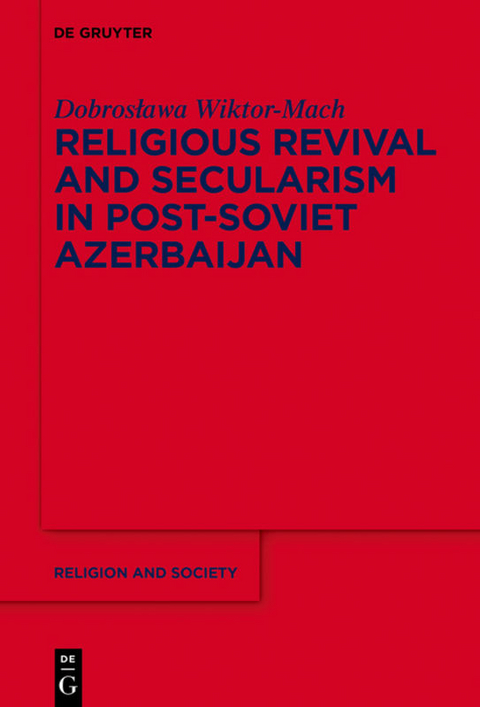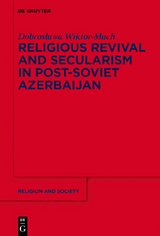Religious Revival and Secularism in Post-Soviet Azerbaijan
Seiten
2017
De Gruyter (Verlag)
978-3-11-053462-7 (ISBN)
De Gruyter (Verlag)
978-3-11-053462-7 (ISBN)
The series Religion and Society (RS) contributes to the exploration of religions as social systems – both in Western and non-Western societies; in particular, it examines religions in their differentiation from, and intersection with, other cultural systems, such as art, economy, law and politics. Due attention is given to paradigmatic case or comparative studies that exhibit a clear theoretical orientation with the empirical and historical data of religion and such aspects of religion as ritual, the religious imagination, constructions of tradition, iconography, or media. In addition, the formation of religious communities, their construction of identity, and their relation to society and the wider public are key issues of this series.
The book explores the complex world of Islam from the perspective of its adherents and activists in Azerbaijan. Baku, the most secular Muslim capital city, is a battlefield for the minds and souls of „ethnic Muslims.” Visiting pirs was till now the typical expression of religiosity among Azerbaijani Muslims. Sunni-Shia division was blurred. Nowadays, Shia and Sunni Muslim movements propose new distinctive identities. Foreign and local preachers took advantage of liberal religious policies of the 1990s to promote their ideas. Salafis stress the „pristine” Islam and the idea of universalism, while Shias underline rationality in their faith tradition. Turkish model of Islam is more inclusive towards local customs. Sufism, although not as powerful as before, also finds a committed audience. Finally, independent charismatic local leaders gain supporters. The book investigates how this pluralism affects both religious groups and believers. Competitive environment requires effective strategies and flexibility. In this process, the traditional dominance of Shiism is challenged by Sunni movements. Shiism, however, is not giving up and adapts its concepts and practices to contemporary contexts.
The book explores the complex world of Islam from the perspective of its adherents and activists in Azerbaijan. Baku, the most secular Muslim capital city, is a battlefield for the minds and souls of „ethnic Muslims.” Visiting pirs was till now the typical expression of religiosity among Azerbaijani Muslims. Sunni-Shia division was blurred. Nowadays, Shia and Sunni Muslim movements propose new distinctive identities. Foreign and local preachers took advantage of liberal religious policies of the 1990s to promote their ideas. Salafis stress the „pristine” Islam and the idea of universalism, while Shias underline rationality in their faith tradition. Turkish model of Islam is more inclusive towards local customs. Sufism, although not as powerful as before, also finds a committed audience. Finally, independent charismatic local leaders gain supporters. The book investigates how this pluralism affects both religious groups and believers. Competitive environment requires effective strategies and flexibility. In this process, the traditional dominance of Shiism is challenged by Sunni movements. Shiism, however, is not giving up and adapts its concepts and practices to contemporary contexts.
Dobrosława Wiktor-Mach, Universität Krakau, Polen.
Dobrosława Wiktor-Mach, Cracow University of Economics, Poland.
lt;p>
| Erscheinungsdatum | 15.07.2017 |
|---|---|
| Reihe/Serie | Religion and Society ; 71 |
| Zusatzinfo | 10 col. ill. |
| Verlagsort | Berlin/Boston |
| Sprache | englisch |
| Maße | 155 x 230 mm |
| Gewicht | 495 g |
| Themenwelt | Geisteswissenschaften ► Religion / Theologie ► Islam |
| Schlagworte | Aserbaidschan • Azerbaijan • Post-Soviet • Postsowjetisch • Religionswissenschaften • Religious Studies • Sociology of Islam • Soziologie des Islam |
| ISBN-10 | 3-11-053462-2 / 3110534622 |
| ISBN-13 | 978-3-11-053462-7 / 9783110534627 |
| Zustand | Neuware |
| Haben Sie eine Frage zum Produkt? |
Mehr entdecken
aus dem Bereich
aus dem Bereich




